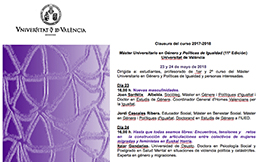
We are pleased to invite the students of the Doctorate in Gender and Equality Policies to the closing ceremony of the 2017-18 course of the Master in Gender and Equality Policies, which this year will be given by Itziar Gandarias (May 23 at 2:00 p.m. hrs.), with the paper entitled: "Until we are all free: Meetings, tensions and challenges in the construction of articulations between groups of migrant and feminist women in Euskal Herria", and by Joan Sanfélix and Jorge Cascales (24th at 14.00 hrs), with the paper entitled: "New masculinities."
 In the current European context of systemic crisis, the lack of links between indigenous and migrated women, at a time when racism and xenophobia are growing day by day, makes it imminent to study the possibilities and limits of a feminist political action in the that the juxtaposition of the different interests of women is the transversal point and starting point for the configuration of articulations. Based on the theory of intersectionality and feminist decolonial perspectives, this thesis studies from a feminist and activist methodology, the possibilities, difficulties and limits for the articulation of common political practices between organizations of migrant women and autochthonous feminists in Euskal Herria. For this, through the Narrative Productions (PN) technique, the current and potential points of articulation and tension between their practices and political action projects are identified. Fruit of sharing the narratives between the groups and organizing a face-to-face meeting, a process of articulation between the collectives is initiated within the context of the Platform of the World March of Women of Euskal Herria, where the researcher begins to take part as an activist. As a consequence of this process, through participant observation and the subsequent dialogue and discussion with the collectives, practices of reproduction and rupture of the colonial and patriarchal heritage among the participants are analyzed. On the one hand, racist attitudes, condescension, monogamous and white thinking, and the (self) underestimation of non-hegemonic knowledge appear as practices that reproduce colonialism among women. On the other hand, during the process two rupturistic practices are identified: the pacts of criticism from the care and privacy policies. These are practices of breaking the colonial and patriarchal logic where the affects, the awareness of the semiotic-material inequalities between the participants and mutual recognition become relevant political tools for the political articulation of differences.
In the current European context of systemic crisis, the lack of links between indigenous and migrated women, at a time when racism and xenophobia are growing day by day, makes it imminent to study the possibilities and limits of a feminist political action in the that the juxtaposition of the different interests of women is the transversal point and starting point for the configuration of articulations. Based on the theory of intersectionality and feminist decolonial perspectives, this thesis studies from a feminist and activist methodology, the possibilities, difficulties and limits for the articulation of common political practices between organizations of migrant women and autochthonous feminists in Euskal Herria. For this, through the Narrative Productions (PN) technique, the current and potential points of articulation and tension between their practices and political action projects are identified. Fruit of sharing the narratives between the groups and organizing a face-to-face meeting, a process of articulation between the collectives is initiated within the context of the Platform of the World March of Women of Euskal Herria, where the researcher begins to take part as an activist. As a consequence of this process, through participant observation and the subsequent dialogue and discussion with the collectives, practices of reproduction and rupture of the colonial and patriarchal heritage among the participants are analyzed. On the one hand, racist attitudes, condescension, monogamous and white thinking, and the (self) underestimation of non-hegemonic knowledge appear as practices that reproduce colonialism among women. On the other hand, during the process two rupturistic practices are identified: the pacts of criticism from the care and privacy policies. These are practices of breaking the colonial and patriarchal logic where the affects, the awareness of the semiotic-material inequalities between the participants and mutual recognition become relevant political tools for the political articulation of differences.
Links:






